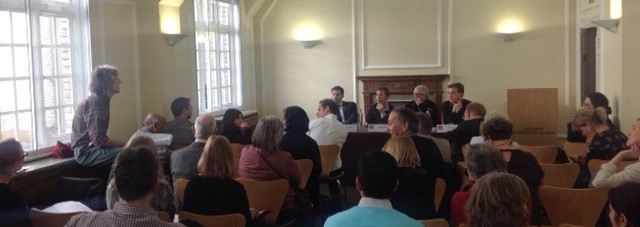A Future Without Poverty – The Future of Welfare Reform and Universal Credit
Posted on 23 Mar 2015 Categories: Blog, Events, Event reports
by Georgia Smith
Sam Bowman, deputy director, Adam Smith Institute
Alison Garnham, chief executive, Chid Poverty Action Group
Andrew Harrop, general secretary, Fabian Society
Chair: David Kirkby, researcher, Bright Blue
Alison Garnham set the scene, saying that inequality in the UK is the second highest in the EU before social security benefits are taken into account. Children are now twice as likely as pensioners to be poor. She felt that measures such as raising the income tax threshold had predominantly benefited richer groups. Universal Credit had three key aims: to simplify the system, to make work pay and to ‘be delivered’. It had failed on all three counts; the system retained the complexity of the different means tests, the taper effect provided little incentive to work and the implementation had been beset by delays and maladministration.
Sam Bowman gave three reasons why he felt that the Beveridge settlement was no longer workable: it was based on households not individuals, it was intended to provide a safety net for only short periods of unemployment and it was based on the assumption that being in work would provide a decent standard of living. International markets, together with a high level of migration, had contributed to continued levels of low pay for the bottom 10 per cent of workers across the developed world. The pressures of further automation, such as driverless cars, would accelerate this trend. He felt that setting a higher minimum wage would simply lead to more unemployment and he saw piecemeal welfare reforms, such as Universal Credit, as highly complex and expensive to administer. He was a supporter of a negative income tax, similar to the concept of citizen’s income, as it would provide an income safety net at a much cheaper cost to administer through the PAYE system.
Andrew Harrop introduced his recent work with the Fabian Society, which demonstrated that on present trends, a further 3.6 million people would be in poverty by 2030. This was inherent in the design of the system given that the indexation of benefits was based on inflation rather than earnings. And the situation could be significantly worse given the Conservative pledge to take a further £12bn a year out of social security. He echoed the point about the cost of the current system, indicating that half the children in the country rely on means testing in some form. He too would favour a simplification of the pay and benefits system, based on the citizen’s income concept, and the Fabian Society was considering doing further work to model such a system.
The discussion was wide ranging and picked up points of agreement between left and right, urging the two think tanks to work together to put forward a simplified benefits system. Other points made included:
- The need to make markets work better for employees, particularly by restoring some means of collective bargaining;
- The strong link between poverty and attainment in schools;
- A need to focus more on non-graduate skills; and
- The key role of housing – we should be building thousands of new houses now, while interest rates are low.
Posted on 23 Mar 2015 Categories: Blog, Events, Event reports

